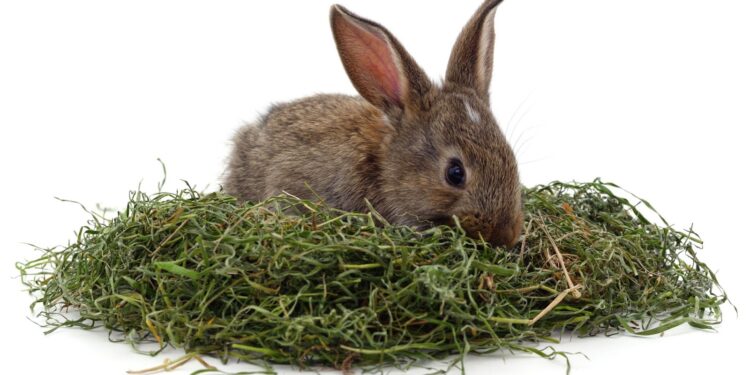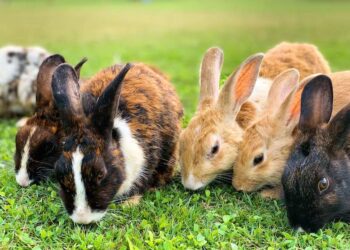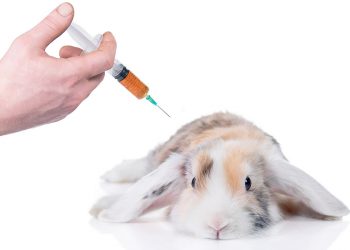Rabbits are known for their cute, floppy ears and fluffy tails, but they’re also beloved for their charming personalities and distinct dietary requirements. As responsible rabbit owners, it’s our duty to ensure they receive the best possible care, starting with the right food. In this article, we’ll explore the essentials of a rabbit’s diet and help you discover the best hay for rabbits, which is a crucial element of their nutrition.
Understanding Your Rabbit’s Diet
Before we delve into the specifics of the best hay for rabbits, let’s take a step back and understand the dietary needs of these small, furry creatures. Rabbits are herbivores, which means their diet primarily consists of plant-based foods.
They have a unique digestive system, featuring a cecum, a pouch located between the small and large intestines, which plays a vital role in breaking down cellulose and extracting nutrients from their food.
Reading Suggestion: Bunny Names
The core components of a rabbit’s diet include:
Hay
High-fiber grasses are a fundamental part of a rabbit’s diet, providing the necessary fiber and promoting healthy digestion.
Pellets
Commercial rabbit pellets offer a balanced mix of essential nutrients and are an easy way to ensure your bunny gets its vitamins and minerals.
Fresh Vegetables
A variety of fresh vegetables, such as leafy greens, carrots, and bell peppers, should be part of their diet.
Fresh Water
Clean, freshwater should always be available to your rabbit.
Treats
Occasional treats like fruits or small amounts of non-leafy vegetables can be given, but in moderation.
The Best Hay for Rabbits
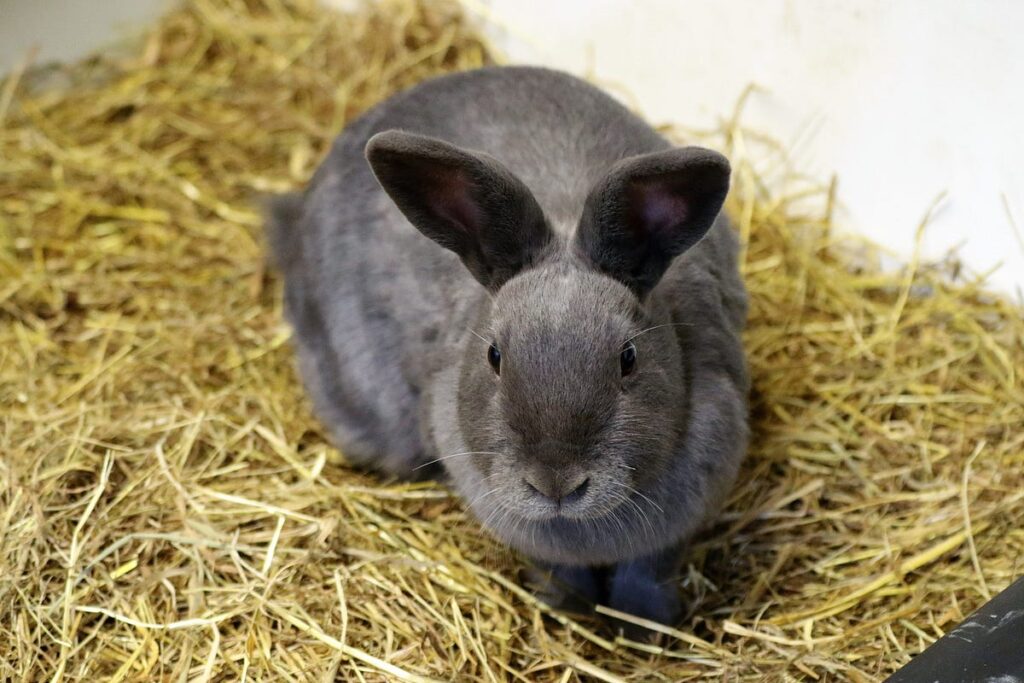
Among these components, hay is arguably the most critical part of a rabbit’s diet. It provides essential dietary fiber and keeps your rabbit’s digestive system healthy. There are various types of hay available, but not all hay is created equal. Here are some of the best hay for rabbits.
Oaten Hay
Oaten Hay is best for Adult rabbits. It is considered high in nutritional value. It is good hay for dental and digestive health. It is a soft hay and although it is mainly used for food it also makes good bedding.
Timothy Hay
Timothy hay is often considered the gold standard for rabbit hay. It’s high in fiber, low in protein, and ideal for adult rabbits. It helps maintain dental health and keeps their digestive system functioning properly.
Orchard Grass Hay
Orchard grass hay is another excellent choice. It has a similar nutritional profile to Timothy hay and can be a great option if your rabbit prefers a different taste and texture.
Meadow Hay
Meadow hay is a mix of different grasses and plants. It provides variety in taste and texture, which can be more enticing for your rabbit. However, it’s essential to ensure that it’s free of pesticides or contaminants.
Bermuda Grass Hay
Bermuda grass hay is another option for your rabbit’s diet. It has a lower fiber content compared to Timothy hay but can be a suitable choice if your rabbit enjoys the taste.
The key to providing the best hay for your rabbit is to offer a variety of hay to keep their diet interesting and ensure they receive a balanced nutritional intake. Some rabbits have preferences, and offering different types of hay can help you determine their favorite.
Reading Suggestion: Angora Rabbit
How to Choose High-Quality Hay
Selecting the right hay for your rabbit is crucial, but it’s equally important to ensure that the hay you choose is of high quality. Here are some tips to help you make the best selection:
Look for Freshness
High-quality hay should be fresh, green, and free of mold or dust. Check for a strong, pleasant smell.
Avoid Hay with Additives
Some commercial hays may have additives or preservatives. It’s best to choose natural, unaltered hay.
Consider the Fiber Content
Different types of hay offer varying fiber levels. Be sure to choose hay that is appropriate for your rabbit’s age and dietary needs.
Check for Cleanliness
Ensure that the hay is clean, with no foreign objects, insects, or contaminants.
Store Hay Properly
Once you’ve purchased hay, store it in a cool, dry place, and protect it from moisture to maintain its quality.
The Importance of Hay in a Rabbit’s Diet
Hay plays a pivotal role in a rabbit’s diet for several reasons:
Dental Health
The act of chewing hay helps maintain healthy teeth. A rabbit’s teeth continuously grow, and chewing hay wears down their teeth, preventing dental issues.
Digestive Health
Hay is high in fiber, which is essential for proper digestion. It keeps the gut moving, reducing the risk of gastrointestinal problems like hairballs or stasis.
Mental Stimulation
Foraging and grazing on hay provide mental stimulation for rabbits, keeping them active and engaged. This mental engagement is not only enjoyable for your rabbit but also helps prevent boredom.
Weight Management
Hay is low in calories but high in bulk, making it an ideal option to help control your rabbit’s weight. If your rabbit is overweight, it can be a useful tool in managing their weight.
Preventing Boredom
Bored rabbits are more likely to engage in destructive behaviors. Hay provides an excellent source of entertainment for your rabbit. It stimulates their natural instinct to forage and keeps them occupied, preventing unwanted behaviors.
How to Incorporate Hay into Your Rabbit’s Diet
Now that you understand the importance of hay in your rabbit’s diet and have a list of the best hay options, it’s time to consider how to incorporate it into their daily meals. Here are some tips:
Free Choice Hay
The simplest way to offer hay is to make it available to your rabbit at all times. Use a hay rack or manger to ensure that hay remains clean and easily accessible. This not only provides a continuous source of nutrition but also mimics their natural behavior of grazing.
Mix with Pellets
To encourage your rabbit to consume more hay, you can mix it with their daily pellets. This will help transition them to a hay-based diet if they are used to pellets. Gradually decrease the pellet portion while increasing the hay portion until hay becomes the primary component of their diet.
Variety is Key
Offer a mix of different hays to keep your rabbit’s diet interesting. This also helps ensure they get a balanced nutritional intake. Rabbits can be picky eaters, and providing a variety of hays can cater to their preferences.
Hand-feed as Treats
Hand-feeding your rabbit small amounts of hay can be a bonding experience. It allows you to interact with your pet and introduce hay as a treat. This is especially useful if your rabbit is hesitant to try new types of hay.
Monitor Your Rabbit
Pay attention to how much hay your rabbit consumes. It’s a good idea to monitor their eating habits. If they are not eating enough hay, it might be a sign of a health issue, and you should consult your veterinarian. Monitoring their hay consumption can also help you adjust their diet if necessary.
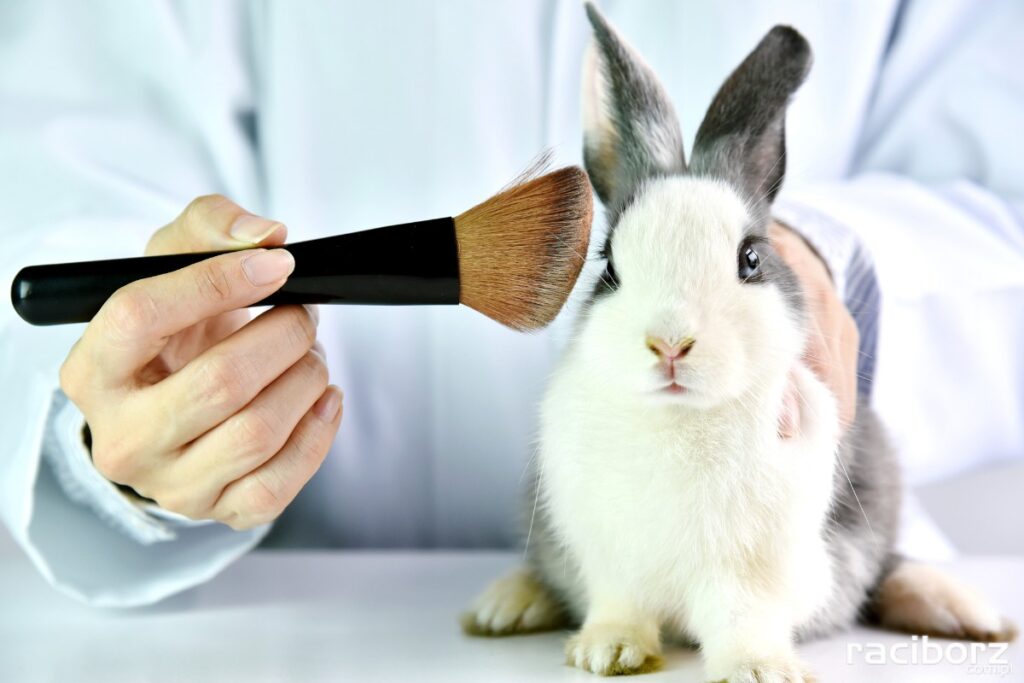
Choosing the best hay for rabbits is a crucial step in providing your furry friend with a healthy and balanced diet. Hay is not only a source of vital nutrients but also an essential tool in maintaining dental health, promoting proper digestion, and preventing boredom.
By offering a variety of high-quality hay options, you can ensure that your rabbit thrives and enjoys a happy, healthy life.
Remember, the key to good rabbit care is understanding their unique dietary needs and providing them with the best possible nutrition. With the right hay and a balanced diet, your rabbit will hop through life with energy and vitality, delighting you with their charming personality and adorable antics.
Rabbit FAQs
1. What is the best type of hay for a young rabbit?
For young rabbits, Timothy hay is an excellent choice as it provides the necessary fiber and nutrients for their growth.
2. Can rabbits eat alfalfa hay?
While young rabbits can consume alfalfa hay, it’s not suitable for adult rabbits due to its high calcium content.
3. How much hay should I feed my rabbit daily?
Rabbits should have access to hay at all times. They can consume hay freely, and it’s a crucial part of their diet.
4. Are there any hays that rabbits should avoid?
Rabbits should avoid hays that are moldy, dusty, or have additives. Stick to high-quality, natural hay options.
5. What role does hay play in preventing obesity in rabbits?
Hay is low in calories but high in bulk, helping rabbits feel full without consuming excess calories, which aids in weight management. Proper hay intake is essential for maintaining a healthy weight in rabbits.


